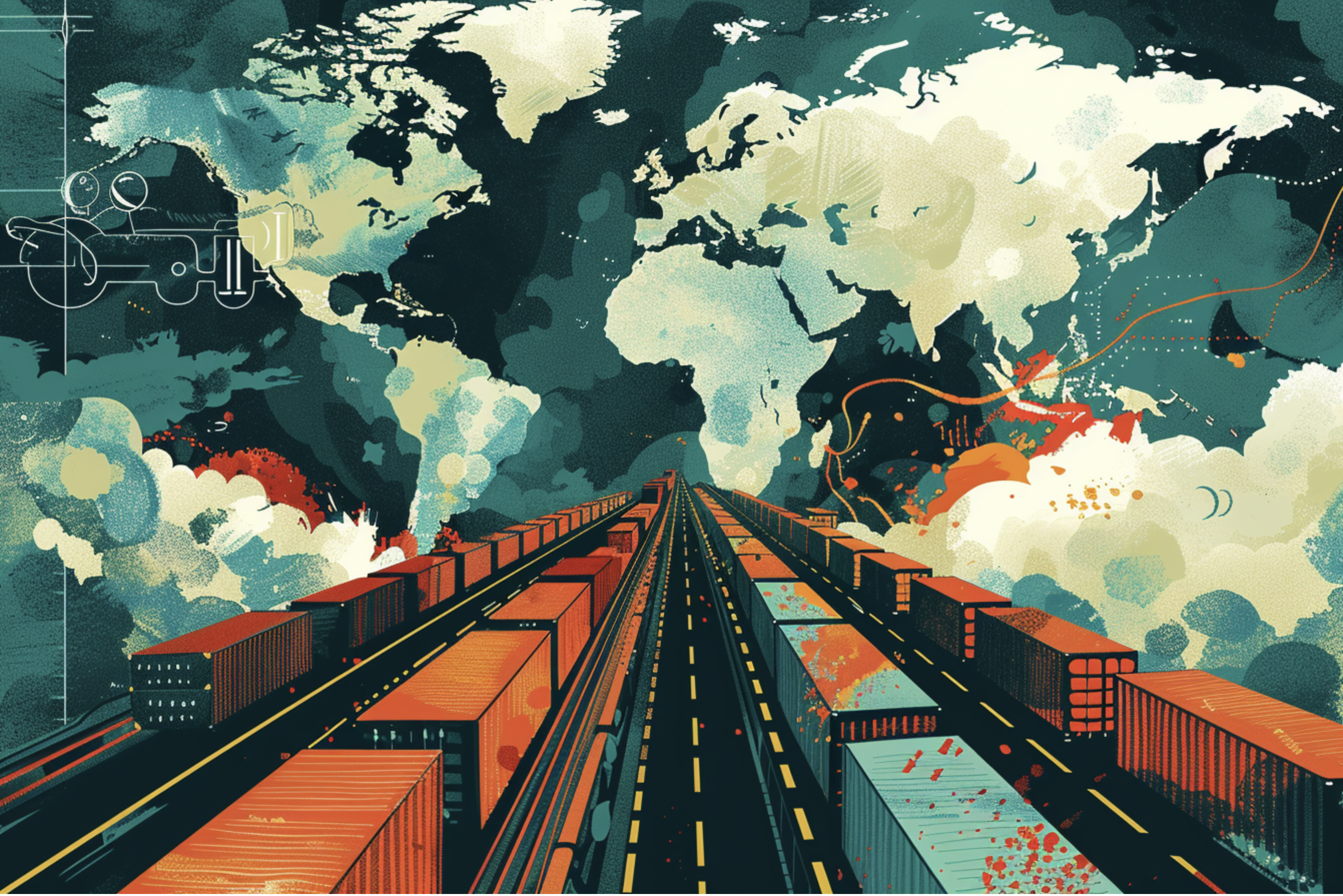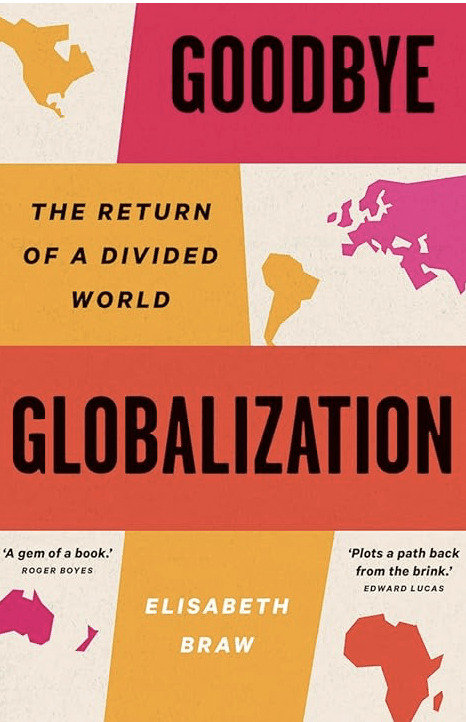Goodbye Globalization, How the EU can Thrive in a Fragmented World
Elisabeth Braw, a widely respected expert in international relations and security, is currently a senior fellow at the Atlantic Council, a think tank based in Washington, D.C. Before transitioning to research, she was a journalist, a background that informed her recent book published by Yale University Press, titled Goodbye Globalization: The Return of a Divided World.

Elisabeth Braw, a widely respected expert in international relations and security, is currently a senior fellow at the Atlantic Council, a think tank based in Washington, D.C. Before transitioning to research, she was a journalist, a background that informed her recent book published by Yale University Press, titled Goodbye Globalization: The Return of a Divided World, which has just won the Axiom Business Book Award.
Elisabeth recently spoke at an event at Bocconi University organized by IEP@BU fellow Professor Andrea Colli. This event provided an opportunity to discuss with Elisabeth the potential implications of globalization's decline from the perspective of the European Union.
How different was your view at the beginning and at the end of the writing process? Were you pessimistic about globalization when you started to work on the book?
I started writing the book in early 2022 because I was convinced that globalization was facing increasingly serious struggles. That assessment is neither optimistic nor pessimistic; it is just realistic. And these trends accelerated while I was writing.
The standoff between China and the West intensified, China increased its crackdown on companies, and now we are, for example, seeing attacks on shipping in the Red Sea by Houthi militias.
Why did you choose to write a reporting book rather than following a more traditionally analytical approach?
There's no other way of writing a book about globalization because globalization is about people—the people who made it happen, the people who experienced it.
So, if you're going to write a book about globalization, you have to hear from the people who have been involved in various ways.
The usual pushback argument against every claim that globalization is over is that in aggregate data we see that global trade has been increasing and doesn’t show any sign of decline. What is your answer?
The loss of faith in globalization that we're seeing is not going to result in plummeting figures tomorrow. Anyone involved with business knows that reacting to a particular set of circumstances can take months or years.
Companies considering reducing their operations in China are not going to leave the country in just a few days; these are extremely complex processes. And international trade statistics will continue to be strong because countries are not engaged in some sort of retreat into autarky—they will simply trade more with countries that are friendlier to them and less with increasingly risky partners, such as China.
That means that we will see increased trade between Western countries and countries that are not exactly like them but are also not hostile to them: countries like India, the Philippines, Vietnam, Mexico.
Goods and services will continue to be traded, but they will not be traded in the way they have been until now with China and to a lesser extent Russia as key protagonists in the globalized economy. And if you're not trading with every country in the world, especially not with two of the most significant countries, then it is not globalization anymore. What is left is simply international trade within blocks and with certain countries.

We need to bring companies back from abroad, but from the voters’ perspective, what is more significant is where those companies are going to invest and who is going to work in friendshored factories
Where do you see the European Union in this fragmented global economy that is emerging?
First of all, we should take one step back and recognize what an extraordinary achievement the EU is: it started as a group of countries that had recently fought a war, and now it is so integrated that we take it for granted that we can operate within the EU as if it were one single country.
From a commercial perspective, we have to recognize that it has proved extremely difficult to integrate other parts of the world to anything resembling the extent of the EU, and it’s getting harder and harder.
At the same time, it is interesting to see that within the EU, there are very different views on how the EU should position itself in the intensifying geopolitical standoff between the US and China, or perhaps the West and the emerging bloc led by China.
We have some countries saying the world has changed and we have to act accordingly, and we have—especially within Germany—politicians wanting to continue trading with China pretty much as if nothing has changed.
In the European business community, more people are saying that China is just not safe enough, and we have to reduce our exposure. At the same time, we see the German Chancellor Olaf Scholz traveling to Beijing for another trade visit, even though the problems for businesses operating in China are clear to all.
Just a couple of days after his trip to China, newspapers reported that German inspectors of pharmaceutical factories are refusing to go to China to inspect their facilities there because they are afraid of being arrested.
Some German Social Democrats hope that the sort of peaceful world of the 1990s and early 2000s can still be recreated, while many other politicians and business leaders think the world has fundamentally changed. If we are going to bring some operations out of China, the big question becomes where are companies going to bring them?
Let’s say I am an Austrian manufacturer and I want to bring my operations back from China. I might bring them to another EU country. . Since the EU is fully integrated, all European citizens benefit if companies invest more within the European Union regardless of which country it happens.
Even if the country where the investment move obviously benefits more, the EU also benefits as well.
Are we at the beginning of a “friendshoring race,” with EU countries competing with one another to attract investments leaving China or maybe India?
EU countries should definitely position themselves to profit from friendshoring, but they should also show solidarity with other EU member states and not try to undermine another countries' effort to attract investment.
If globalization is in retreat, how can we deal with intrinsically global issues that require global governance, such as the climate crisis and AI regulation?
The problem is that the so-called “rules-based international order” that we built after the Second World War works only if countries do what they have promised to do, since there is no effective enforcement mechanism.
The reason why the WTO is in jeopardy is because some countries have violated their WTO commitments with no consequences.
The most extreme example of this challenge to the “rules-based international order” are the Houthi attacks on global shipping in the Red Sea, since the Houthis’ partner Iran has signed the treaties that govern the global maritime order..
The “rules-based international order” was built on the assumption that countries would do the right thing, but today we live in a world where they can blatantly violate their obligations with no major consequences. This has long been the case with smaller countries like North Korea, but now also with much bigger ones, such as Russia and China.

EU countries should definitely position themselves to profit from friendshoring, but they should also show solidarity with other EU member states and not try to undermine another countries' effort to attract investment
If you had to advise the EU Commission, would you suggest defending what is left of the “rules-based international order” or simply to pursue the maximum gain in the new fragmented world, with a non-cooperative approach?
We still need to work with China, and we still need to work with Russia, even if in a limited way, on issues such as climate change.
One measure could be taken that is also implementable: a permanent dialogue between top policymakers in the European Union and top business leaders. This would allow both sides to exchange insights about threats in different parts of the world, and it would also help business leaders think of themselves and of their companies as citizens of their home countries rather than citizens of nowhere.
That matters because China and Russia don't see a difference between companies and their home states, and when they want to punish other countries they increasingly do so by targeting their companies.
Business leaders are usually agnostic, and they assess situations from a business-operations perspective. However, the reality is that for them it has become much more dangerous to operate in China and Russia.
Until now, China’s leadership has prioritized increasing prosperity for the country’s population, but what we have seen in the past couple of years is that the Chinese government is essentially saying the private sector in China has become too strong and a threat to political power. That’s why they have cracked down on Jack Ma and other business titans.
Your book offers a very Western perspective on globalization. Do you think that the outcome would have been completely different had you chosen an African or an Asian point of view on globalization?
Sure. I’m a Westerner providing a Western perspective. If other books with Asian or African perspectives were written, they would probably tell a very different story.
I am sure that if somebody from China, Russia, or Southeast Asia would write such a book, they would talk a lot about the arrogance of Western governments, and especially Western companies with Western managers who arrived in the late 80s and early 90s to reshape local economies and societies.
Do you think that the crisis of globalization will shape the forthcoming European and US elections?
We’ll see many elections where the consequences of globalization’s troubles will play a significant role. We need to bring companies back from abroad, but from the voters’ perspective, what matters is where those companies are going to invest and who is going to work in friendshored factories.
What kind of training will workers need? If we bring manufacturing jobs back, should still encourage the majority of teenagers to pursue university degrees? The manufacturing jobs we’re likely to see will be very qualified, but if people keep viewing manufacturing jobs as less prestigious than jobs requiring a university degree, friendshoring won’t work.
Secondly, we need to have a conversation on the inflation that’s likely to result from friendshoring: consumer prices will rise because it's more expensive to make products at home than it has been in China. The artificially low prices that Western consumers have experienced in the last three and a half decades are over, and this will have political consequences.
IEP@BU does not express opinions of its own. The opinions expressed in this publication are those of the authors. Any errors or omissions are the responsibility of the authors.
